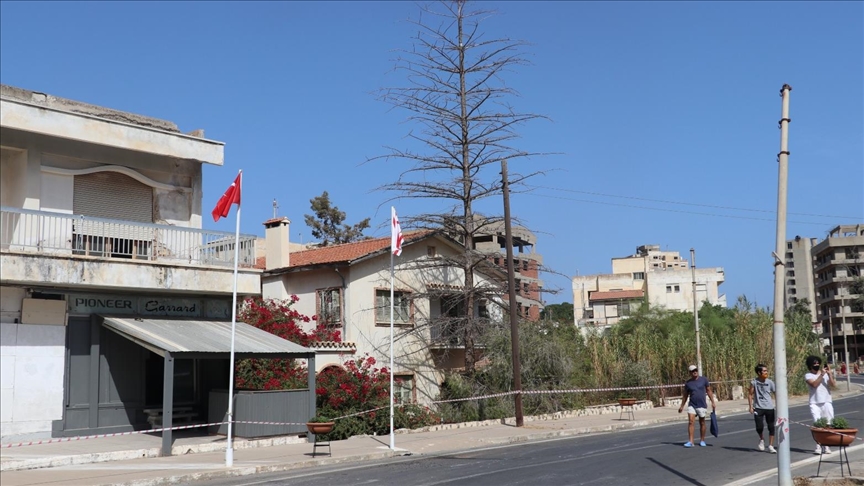 People appear at streets of the abandoned town in Closed Maras (or Varosha in Greek) after the city reopened for public use after 46 years in Turkish Republic of Northern Cyprus (TRNC) on October 8, 2020 ( Ali Ruhluel - Anadolu Agency )
People appear at streets of the abandoned town in Closed Maras (or Varosha in Greek) after the city reopened for public use after 46 years in Turkish Republic of Northern Cyprus (TRNC) on October 8, 2020 ( Ali Ruhluel - Anadolu Agency )
LEFKOSA, Turkish Republic of Northern Cyprus
The partial reopening of the Maras region in the Turkish Republic of Northern Cyprus (TNRC) was done in accordance with civil rights, the TRNC’s president said Tuesday.
Ersin Tatar, who received the president of the Immovable Property Commission (TMK), Novber Ferit Vechi, said the commission has an important duty.
He underlined that the Greek Cypriot side's pressure on its citizens not to apply to the TMK is not correct behavior.
Noting that Maras was reopened with the support of Turkiye, he said the regulations made were shared with the whole world.
"We stated that if an application is made, the TMK will evaluate it. It has been decided by the Council of Ministers that the assets in the 3.5% pilot region will be returned to the applicants," he added.
Tatar said the reopening of Maras is an important political step, adding the TRNC’s policy enabled it to happen.
Maras, or Varosha in Greek, had virtually become a ghost town as it remained cut off from the world for some 47 years.
A portion of the region -- just about 3.5% of the total area -- was reopened in October 2020, with people welcome to visit between 8 a.m. and 8 p.m. daily.
Maras was abandoned after a 1984 UN Security Council resolution saying that only its original inhabitants could resettle the town.
Entry into the town was forbidden except for Turkish army personnel stationed in the TRNC.
Turkish and TRNC authorities have repeatedly called on Greek Cypriots and other citizens who own assets in Maras to apply to the Immovable Property Commission.
Decades-long dispute
Cyprus has been mired in a decades-long dispute between Greek and Turkish Cypriots, despite a series of diplomatic efforts by the UN to achieve a comprehensive settlement.
Ethnic attacks starting in the early 1960s forced Turkish Cypriots to withdraw into enclaves for their safety.
In 1974, a Greek Cypriot coup aimed at Greece’s annexation of the island led to Turkiye’s military intervention as a guarantor power to protect Turkish Cypriots from persecution and violence. As a result, the TRNC was founded in 1983.
It has seen an on-and-off peace process in recent years, including a failed 2017 initiative in Switzerland under the auspices of guarantor countries Turkiye, Greece and the UK.
The Greek Cypriot administration entered the European Union in 2004, the same year Greek Cypriots thwarted a UN plan to end the longstanding dispute.





